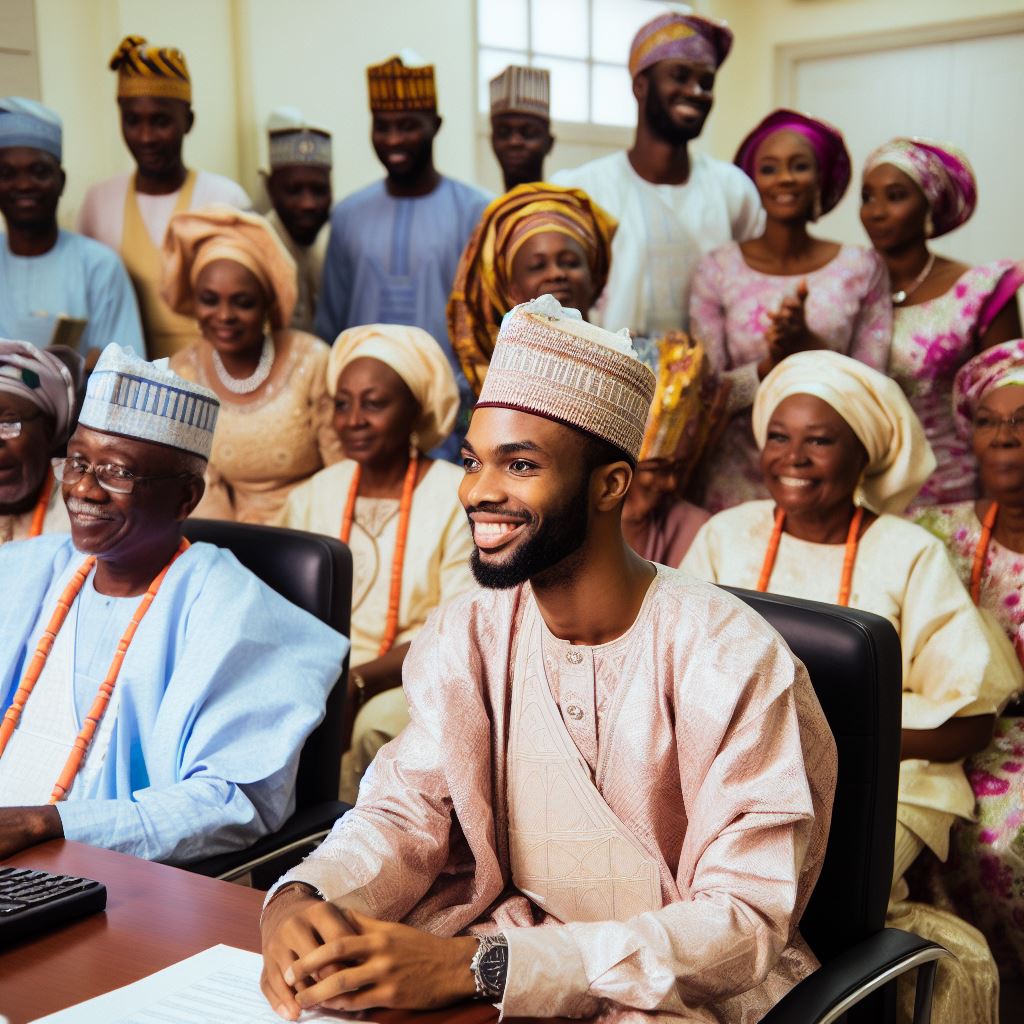Court Marriages in Nigeria: A Step-by-Step Guide
Last Updated on January 28, 2024
Introduction
Explanation of court marriages in Nigeria
In Nigeria, court marriages are legal unions between two individuals that are officiated by a judge or magistrate.
These marriages are recognized by the law and hold the same legal rights and obligations as traditional marriages.
Having a step-by-step guide for court marriages in Nigeria is essential for individuals who wish to navigate the process successfully. It provides clear instructions and ensures that all necessary requirements are met.
Without a guide, the process can be confusing and time-consuming, leading to mistakes or even the invalidation of the marriage.
Importance of having a step-by-step guide for court marriages
Therefore, having a step-by-step guide is crucial not only for the smooth execution but also for the legal validity and protection of the marriage.
It provides a comprehensive overview of the entire process, from the initial preparation to the final registration.
This guide will break down each step in detail, explaining the requirements, documents needed, and the necessary appointments.
It will also address common challenges and provide tips for overcoming them.
By following this guide, couples can confidently navigate the court marriage process in Nigeria, saving time, effort, and avoiding potential legal complications.
Having a step-by-step guide for court marriages in Nigeria is of utmost importance.
It ensures that couples understand and adhere to the necessary procedures, resulting in a legally recognized and protected marriage.
Without this guide, the process can be daunting and may lead to unnecessary delays and complications.
So, let’s dive into the step-by-step guide and demystify the court marriage process in Nigeria.
Legal Requirements for Court Marriages in Nigeria
Court marriages in Nigeria are governed by certain legal requirements that must be fulfilled by the parties involved.
These requirements ensure that the marriage is recognized and legally binding in the country. In this section, we will explore the key legal requirements for court marriages in Nigeria.
1. Age requirement
Both parties must meet the minimum age requirement set by the Nigerian law, which is 21 years old for the bride and 18 years old for the groom.
2. Consent of parties involved
The consent of both the bride and the groom is essential for a court marriage to be considered valid. It is important that both parties willingly and freely give their consent to enter into the marriage.
3. Declaration of spinsterhood/bachelorhood
Before entering into a court marriage, it is mandatory for both the bride and the groom to declare that they are either single, divorced, or widowed.
This declaration ensures that there are no legal hindrances to the marriage.
4. Proof of barrenness (if applicable)
In cases where either party has been previously married and is unable to bear children, it is necessary to provide medical evidence of the infertility. This proof is required to prevent future claims of marital fraud.
5. Consent of parents/guardians (if applicable)
If either the bride or the groom is a minor, the consent of their parents or legal guardians is required for the court marriage to proceed.
This ensures that the minor is not being coerced into the marriage.
6. Dissolution of previous marriage (if applicable)
If either party was previously married, they need to present legal documentation showing the dissolution or divorce of the previous marriage. This is to ensure that the individuals are legally free to marry again.
7. Registration with the marriage registry
After fulfilling all the necessary requirements, the court marriage must be registered with the marriage registry.
This step is crucial for the marriage to be formally recognized by the government and for the issuance of a marriage certificate.
Meeting these legal requirements is of utmost importance when planning a court marriage in Nigeria.
Failing to comply with any of these requirements may render the marriage null and void, which can lead to legal complications in the future.
Seeking legal counsel or consulting the marriage registry is wise to ensure correct completion of necessary documents and steps.
This will help to ensure a smooth and legally recognized court marriage in Nigeria.
Court marriages in Nigeria have specific legal requirements that must be met for the marriage to be valid.
These requirements include the age of the parties involved, consent of all parties, declaration of spinsterhood/bachelorhood, proof of barrenness (if applicable).
Consent of parents/guardians (if applicable), dissolution of previous marriage (if applicable), and registration with the marriage registry.
Adhering to these requirements is vital to ensure a legally binding court marriage in Nigeria.
Read: The ‘Married at First Sight’ Phenomenon: Nigeria’s Perspective
Step-by-Step Guide for Court Marriages in Nigeria
Pre-marriage preparations
- Gathering required documents
- Birth certificates
- Identification cards
- Affidavit of bachelorhood/spinsterhood
- Medical certificate of fitness
- Dissolution of previous marriage document (if applicable)
- Consent forms (if applicable)
- Approval from parents/guardians (if applicable)
- Choosing the appropriate marriage registry
Registration Process
- Visit the selected marriage registry
- Submit required documents
- Pay registration fees
- Set a date for the wedding ceremony
Wedding Ceremony
- Arrive at the marriage registry on the scheduled date
- Witnesses and guests
- Solemnization of the marriage
- Signing of the marriage certificate
- Issuance of the marriage certificate
Post-marriage Requirements
- Obtain a certified true copy of the marriage certificate
- Change of name (if desired)
- Register the marriage in other relevant institutions (e.g., banks, insurance companies, etc.)
- Update personal documents with marital status change
It’s essential to consult with professionals, such as legal and financial advisors, to ensure that you’re addressing all necessary legal and financial matters effectively.
Read: Couples of the Bible: Stories and Marriage Verses

Benefits of Court Marriages in Nigeria
Court marriages in Nigeria offer numerous advantages and benefits for couples who choose this legal union.
From legal recognition and protection to ease of dissolution and evidence for rights, court marriages provide a secure and socially acceptable option for couples.
Here are some key benefits of opting for a court marriage in Nigeria:
1. Legal recognition and protection
Court marriages in Nigeria carry legal recognition, providing couples with a secure and official status.
Such recognition assures acknowledgment of the couple’s union by the state and society, providing legitimacy and legal protection.
2. Ease of dissolution in case of separation
One of the significant advantages of court marriages is the ease of dissolution in the event of separation.
Court marriages usually have simpler legal procedures and divorce or annulment requirements compared to customary marriages.
This offers couples a more straightforward path if their relationship ends.
3. Evidence for legal rights and benefits
Court marriages serve as concrete evidence for various legal rights and benefits in Nigeria.
By having a court marriage certificate, couples can access and claim spousal privileges, including inheritance rights, healthcare benefits, and property ownership, among others.
This legal documentation strengthens their position in society and ensures protection of their rights.
4. Social acceptance and validation
Court marriages in Nigeria enjoy a higher degree of social acceptance and validation compared to other forms of unions.
The legal backing makes it easier for couples to gain recognition from their families, communities, and even religious institutions.
This acceptance brings stability and social standing to the relationship, fostering a sense of belonging and security.
5. Protection against disputes and uncertainties
Court marriages provide couples with legal protection against disputes and uncertainties that may arise in the future.
The marriage certificate serves as proof of the union, anchoring the rights and responsibilities of both parties.
This protection helps to minimize potential conflicts and ensures a smoother resolution in case of any disagreements or misunderstandings.
Court marriages in Nigeria offer numerous benefits, making them a desirable option for couples seeking legal recognition and protection.
The ease of dissolution, evidence for legal rights, social acceptance, and protection against disputes contribute to the advantages of court marriages.
By choosing this legal union, couples can find security, stability, and peace of mind in their relationship.
Read: Heartfelt Marriage Prayers and Their Bible Origins
Common Challenges and FAQs about Court Marriages in Nigeria
In this section, we will discuss the common challenges faced and answer frequently asked questions about court marriages in Nigeria.
1. Lack of awareness about the process
Many Nigerians lack knowledge about the process of court marriages and are unaware of its benefits. It is essential to educate the public about this alternative form of marriage.
2. Cultural and religious beliefs
Traditional and religious beliefs frequently dissuade court marriages, considering them a deviation from customs and rites linked to traditional marriages.
Overcoming these misconceptions is crucial to promoting court marriages.
3. Concerns about cost and time
Some individuals are hesitant to opt for court marriages due to concerns about the financial implications and time-consuming nature of the process.
Clear information about the costs and time taken can alleviate these concerns.
4. Implications of not registering a marriage
Failure to register a marriage can have serious legal consequences. It may lead to difficulties in accessing certain benefits and protections that registered marriages provide.
Emphasizing the importance of registration is crucial.
5. Differences between court marriages and traditional marriages
Understanding the distinctions between court marriages and traditional marriages is essential.
While traditional marriages involve intricate customs and traditions, court marriages are a simpler and legally recognized alternative.
Read: From Adam and Eve: Lessons on Marriage in the Bible
Delve into the Subject: Overcoming Past Traumas in a Nigerian Marriage
Conclusion
Court marriages in Nigeria are a straightforward process that provides legal protection and recognition to couples.
This guide has outlined the step-by-step procedure:
- Obtain and complete the Marriage Notice Form from the marriage registry.
- Submit the form alongside required documents like birth certificates, passports, and marriage certificate.
- Pay the necessary fees and schedule a date for the marriage ceremony.
- Attend a counseling session to gain valuable advice on marriage.
- Exchange vows and sign the marriage register in the presence of witnesses.
- Request certified copies of the marriage certificate for future use.
It is crucial to follow this legal process to ensure the validity of the marriage. By adhering to the requirements, couples can avoid future complications.
Moreover, court marriages provide legal protection and recognition for the couple and their children.
It allows spouses to claim inheritance rights, access healthcare and insurance benefits, and make joint decisions.
We encourage readers to consider court marriages for these benefits and the peace of mind they bring.
It offers a solid foundation for a thriving future together, minimizes disputes, and ensures a secure union.
Remember, love is not enough; legally protecting your union is equally important. Choose court marriages for a strong and recognized bond.


